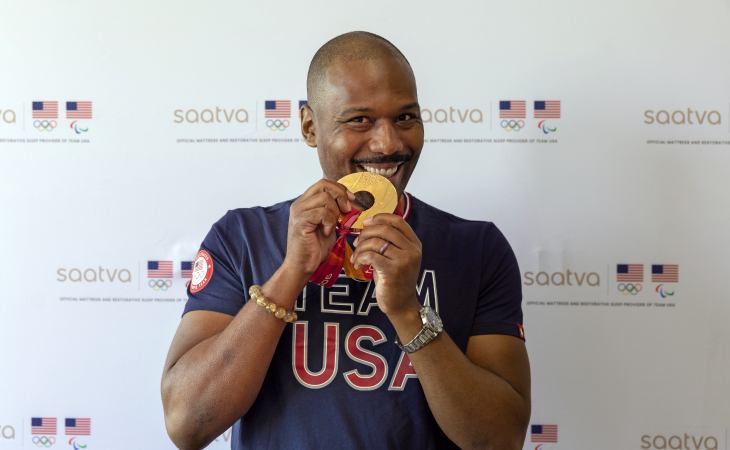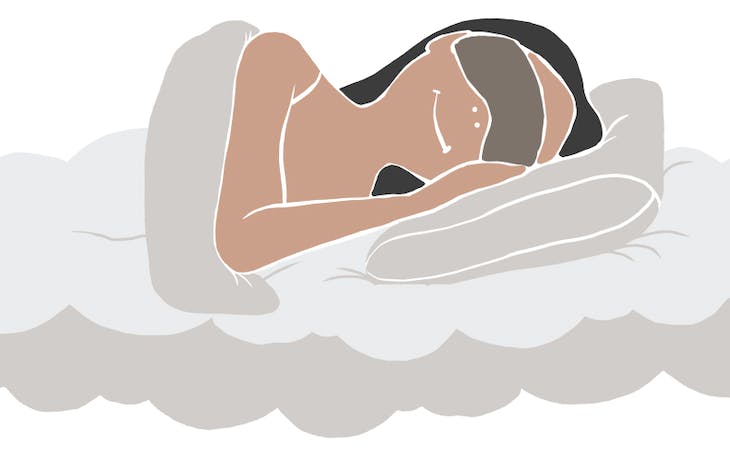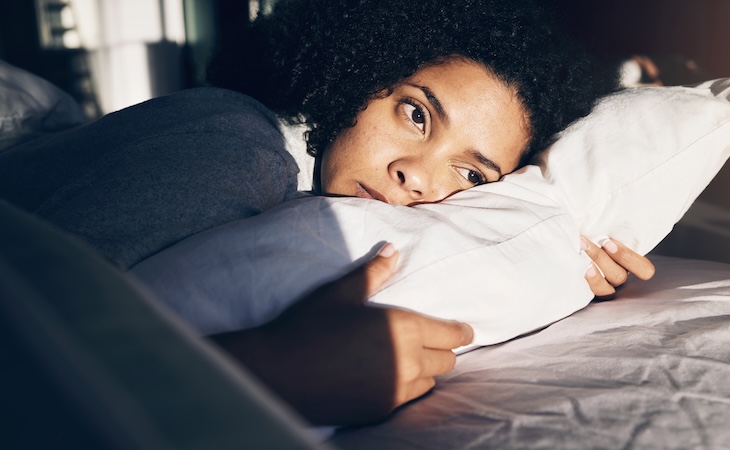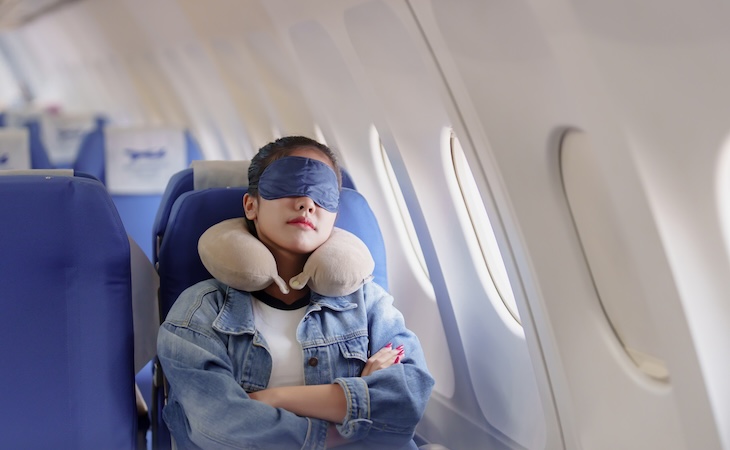
Sleep Health, Sleep Disorders & Conditions
December 3, 2018
How One Woman Fought Insomnia (and Won)
Written by Christina Heiser

Laurel McBrine struggled with insomnia due to stress and hormonal changes. She found relief by using adaptogenic herbs, changing her sleep habits, and making lifestyle changes such as eliminating caffeine and using blackout curtains. Insomnia is common, especially in middle-aged women, and can be treated with lifestyle and dietary changes.
Laurel McBrine struggled with insomnia for years. The 59-year-old professional artist, holistic nutritionist, and fitness enthusiast had serious trouble falling and staying asleep throughout her late 30s and early 40s.
The main culprit for McBrine: stress. She was juggling raising two young children with a demanding career as a portrait painter. Then, shortly after having her second child at 41, McBrine started going through the beginnings of menopause, which the National Sleep Foundation links to insomnia (due to the hormonal changes a woman’s body goes through during this period).
McBrine also says her sleep hygiene habits were lacking: She used to drink too much coffee and exercise too late in the day, which left her feeling energized at night, and she stayed up late watching TV.
Getting insomnia under control
McBrine’s sleep woes led her to investigate insomnia treatments, and after visiting a naturopathic doctor and learning about the sleep benefits of certain herbs and supplements, she got certified as a holistic nutritionist to boot. Now, McBrine relies on adaptogenic herbs that regulate the stress hormone cortisol, such as ashwagandha and ginseng, to help her sleep. (Note: The Food and Drug Administration, FDA, doesn’t regulate the use of herbs as sleep supplements, so always consult with your doctor before adding any to your routine.)
McBrine also changed her sleep habits. For starters, she installed blackout curtains in her bedroom (since light inhibits the melatonin release necessary to help you fall asleep) and nixed caffeine from her diet completely.
Additionally, she takes warm baths at night so that her body temperature drops to a comfortable enough level to drift off afterward, doesn’t eat big meals before bed as this can cause sleep-wrecking acid reflux, and keeps her phone plugged in downstairs so she’s not tempted to mindlessly scroll through Facebook from bed late at night.
Signs you have insomnia
McBrine’s story isn’t all that unique—insomnia is actually a pretty common sleep disorder. According to the American Sleep Association, 30% of adults in the U.S. report short-term insomnia, and 10% report chronic insomnia. Rebecca Park, a registered nurse in New York City and founder of the blog RemediesForMe.com, says insomnia is more common in middle-aged and older adults, and women are more likely to develop it than men (once again, chalk it up to hormones).
Typically if you have acute, or short-term, insomnia, that means you have trouble falling or staying asleep for three nights a week for at least two consecutive weeks. Chronic insomnia, on the other hand, lasts for more than three months. (Here’s what causes insomnia after surgery.)
According to Park, these are the most common signs of insomnia:
- Difficulty falling asleep
- Struggling to stay asleep and waking up frequently throughout the night
- Feeling tired after waking up in the morning
- Feeling fatigued and irritable during the day
- Finding it difficult to concentrate due to fatigue
Insomnia cures to try tonight
What can you do to treat your own insomnia? As McBrine learned in her quest to curb insomnia, making lifestyle and dietary changes is key. Here, health experts weigh in on insomnia cures you can try for a better night’s sleep.
Only go to sleep when you’re tired
One of the biggest mistakes people make is that they try to go to sleep before they’re really ready—and that leads to a cycle of not sleeping and worrying about being awake, says Jonathan Alpert, New York City-based psychotherapist and author of Be Fearless: Change Your Life in 28 Days. If you hop into bed when you’re not actually sleepy, you could end up tossing, turning and stressing over not being able to conk out, which will make it even more difficult to fall asleep.
Say no to sugar before bed
Eating too close to bedtime can make it harder for you to fall asleep, especially if what you’re noshing on is loaded with sugar or is very fatty. The ideal pre-bedtime snack contains one serving of protein and one serving of carbs (like an apple with almond butter) to prevent sleep-inhibiting blood sugar swings. Park suggests sipping tart cherry juice before bed. Studies, like this one published in the Journal of Medicinal Food, have found that tart cherries, which contain melatonin, promote sleep.
Exercise early in the day
For better sleep, lace up your sneakers and hit the gym. Research published in the journal Sleep found that physical activity is associated with more efficient sleep— meaning that those who exercised more spent less time lying awake in bed. That being said, when you exercise definitely matters. Some people find it more difficult to fall asleep when they work out at night since it can boost adrenaline and cortisol levels. The National Sleep Foundation hypothesizes that exercise works as an insomnia treatment because it results in a post-workout body temperature drop that promotes sleep, and it also curbs symptoms of anxiety, which can make good sleep harder to achieve. (Learn more about how morning workouts benefit sleep.)
Skip the coffee and booze at night
Drinking coffee before hitting the sheets will also ruin your chances of uninterrupted sleep. Alpert recommends stopping coffee six hours before bed. That’s because caffeine has a half-life of close to six hours. What that means: If you down a large iced coffee containing 200 milligrams of caffeine at noon, then you’ll still have 100 milligrams of caffeine in your system at 6 p.m. Alcohol can also impact your ability to sleep, and not in a good way. Most people metabolize one drink every two hours, but this is affected by everything from body size to gender, so when you should quit drinking before bed will depend on a few factors.
Ban your phone from your bed
If you use your phone as an alarm clock, know that the blue light emanating from it can trick your brain into staying awake when you should be snoozing, says Alpert. Plus, if you sleep with your phone by your bed, you could be tempted to check Instagram or respond to texts, which is why Alpert suggests making your bedroom a device-free zone close to bedtime. (Here are three ways to wake up without an alarm clock.)
Limit what you do in bed
There are only two activities that should ever happen in bed, says Alpert: sleep and sex. (Follow our advice to find the best mattress for sex.) You want your bedroom to be as relaxing an environment as possible, and working, eating, and watching TV while you’re in your bed will make it anything but that. (Here’s why you can’t fall asleep alone.)
Be cautious with sleep supplements
It may be tempting to take a natural sleep supplement like melatonin, but doctors urge caution since supplements aren’t regulated by the FDA. Melatonin is often sold in doses of 1-3 milligrams, but that large of a dose can cause side effects like headaches, dizziness, nausea, and drowsiness. If you are interested in trying melatonin, speak with your doctor first and stick to a smaller dose: 0.1 or 0.3 milligrams is all you need for potential sleep-inducing effects.
The bottom line: Making lifestyle changes is the first step to curing insomnia. If you find sleeping through the night is still an uphill battle after switching up your habits, visit your doctor, as chronic insomnia could be caused by an underlying health problem.
For more sleep tips, here are 10 nighttime activities to help you relax.
Christina Heiser
Christina Heiser is the content director at Saatva. She has held previous positions at Everyday Health, Women’s Health, and L’Oréal. Christina serves as an ambassador for the nonprofit organization Beyond Celiac and is passionate about raising awareness about celiac disease. When she’s not working, you can find Christina traveling the world in search of the best gluten-free eats and trying out the latest beauty, fitness, and wellness trends. Check out her newsletter, Celiac Self-Care.


